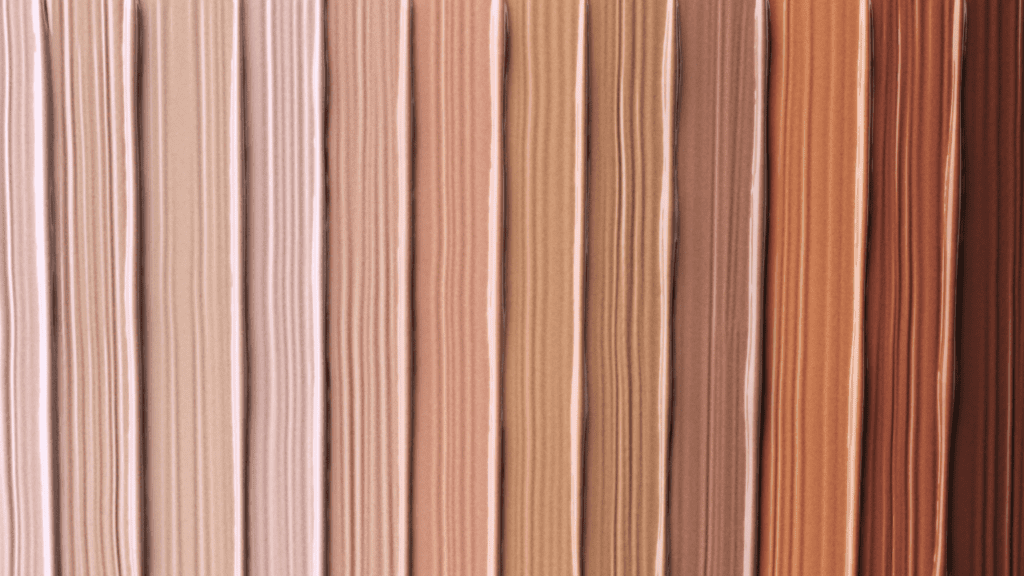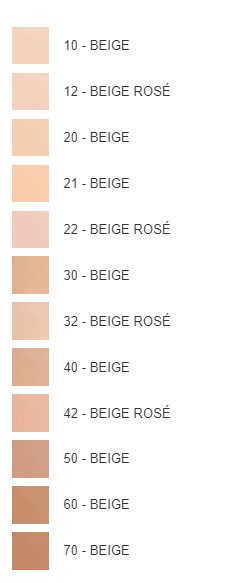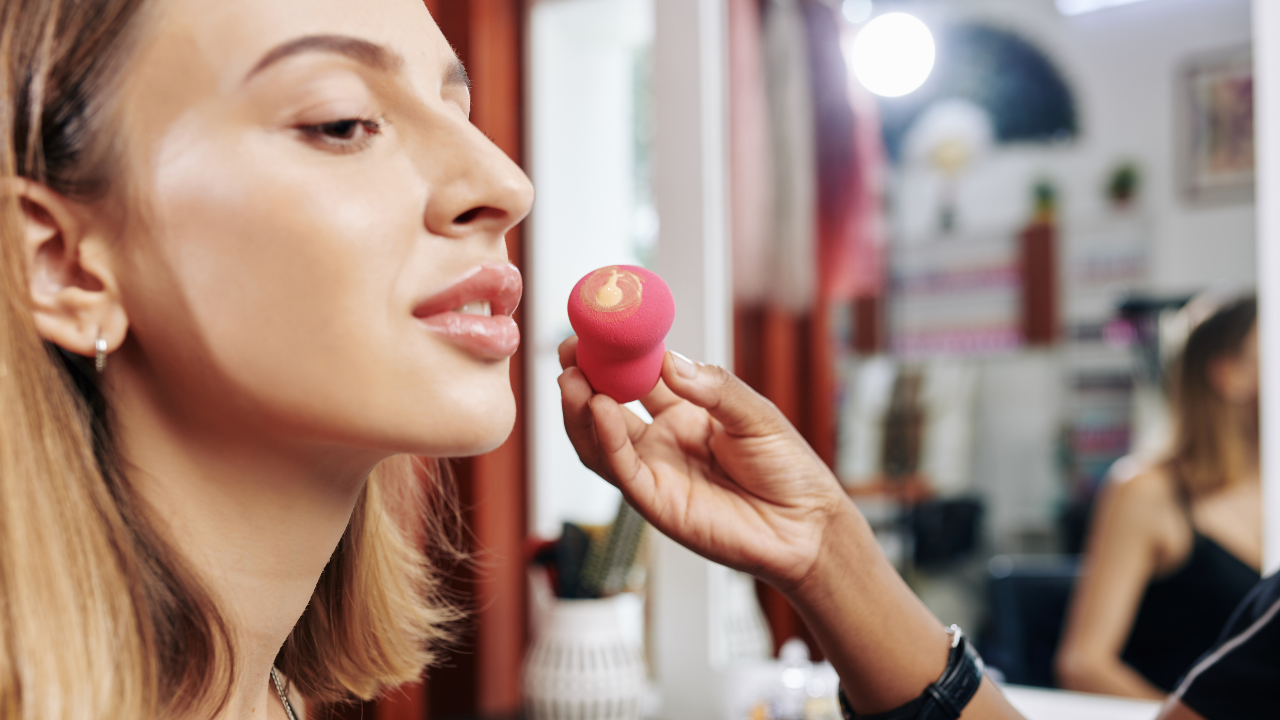this post was originally published on 2 February 2022. It was last updated on 6 September 2024.

As a professional makeup artist, one of the most crucial decisions you’ll make is selecting the right foundations for your kit. This choice can make or break your reputation and significantly impact your clients’ satisfaction. In this post, I’ll dive deep into the world of foundations, exploring everything from shade selection to formula types, and provide you with expert tips to build a versatile and effective foundation collection.
The Importance of Complexion Work in Makeup Artistry
Before we delve into the specifics of choosing foundations, let’s talk about why complexion work is so vital in your career as a makeup artist. While you might initially get hired for your ability to create dramatic eye looks or perfect that red carpet-ready lip, it’s your skill in perfecting the complexion that will keep clients coming back and recommending you to others.
View this post on Instagram
Think about it: the foundation (pun intended) of any great makeup look is flawless skin. Whether your client wants a natural, dewy finish for their wedding day or a full-coverage, matte look for a photoshoot, the quality of your complexion work will be the first thing people notice.
A seamless, well-matched foundation application can:
- Boost your client’s confidence
- Enhance the overall impact of your makeup artistry
- Photograph beautifully, leading to more bookings and referrals
- Demonstrate your technical skill and attention to detail
Now that we’ve established why foundation is so crucial let’s dive into how to choose the best ones for your kit.
6 Essential Questions to Ask Before Adding a Foundation to Your Kit:

Question 1: Will I use it frequently?
This question is all about practicality and cost-effectiveness. As a makeup artist, you know that products in your kit have a limited shelf life. Foundations, in particular, can expire relatively quickly, especially if they’re not used regularly. Expired products not only waste your money but can also pose health risks to your clients.
When you’re just starting out, it can be tempting to buy every foundation under the sun. However, it’s much smarter to start with a core collection of versatile foundations that you know you’ll use often. As you gain more experience and understand your client base better, you can expand your collection strategically.
Pro Tip: Keep track of how often you use each foundation in your kit. If you notice that some are barely touched after several months, consider removing them to make space for products you’ll use more frequently.
If you are just now in the midst of building your pro kit, I highly suggest you either book a kit-building call with me here so I can help you map out your process step-by-step, saving you a lot of time and money!
Question 2: Does it offer buildable coverage?
Versatility is key in a professional makeup kit. You need foundations that can create a range of looks, from barely-there, no-makeup makeup to full-glam, high-coverage finishes. This is where buildable coverage comes in handy.
Buildable foundations allow you to start sheer and gradually increase coverage where needed. This flexibility is invaluable when working with different clients and for various occasions.
For instance:
- For a natural daytime look, you might apply a single sheer layer.
- For a more polished evening appearance, you could build up to medium coverage.
- For photography or film work, you might need to achieve full coverage in certain areas.
A great example of a buildable foundations are labelled as face & body foundations. These formulations starts incredibly sheer but can be built up to medium coverage. It works beautifully on youthful skin, doesn’t settle into fine lines on mature skin, and gives a healthy glow to all skin types.
Question 3: Is it suitable for various skin types?
As a professional, you’ll work with clients who have a wide range of skin types and concerns.
Your kit needs to include foundations that cater to:
- Oily skin
- Dry skin
- Combination skin
- Sensitive skin
- Mature skin with fine lines and wrinkles
- Acne-prone skin
Look for foundations that offer benefits for different skin types. For instance, foundations with hyaluronic acid can be great for dry or mature skin, while oil-free, non-comedogenic formulas work well for oily or acne-prone skin.
Remember, skin type isn’t the only factor to consider. You also need to think about skin concerns like redness, hyperpigmentation, or uneven texture. Some foundations are formulated to address these issues, which can be a great addition to your kit.
Question 4. Does it perform well in your working climate?
The climate you work in can significantly impact how a foundation performs.
Consider the following:
- Humid climates: Look for long-wearing, water-resistant formulas that won’t slide off in the heat.
- Dry climates: Opt for hydrating foundations that won’t accentuate dry patches or get sucked into the skin.
- Variable climates: Choose versatile foundations that can be adapted with primers and setting products.
While proper skin prep can mitigate many climate-related issues, having foundations that naturally perform well in your working environment will make your job much easier.
Question 5. Is it available with a professional discount?
While this isn’t always a deal-breaker, having access to pro discounts can significantly impact your bottom line as a makeup artist. Many brands offer professional programs that not only provide discounts but also give you early access to new products and exclusive training opportunities.
Moreover, brands that offer pro discounts often understand the unique needs of makeup artists. Their products are typically formulated with professional use in mind, meaning they perform well under various conditions like film, television, stage, and photography.
Some brands known for their excellent pro programs include:
- MAC Cosmetics
- Make Up For Ever
- Kryolan
- RCMA
- Cinema Secrets
Question 6: Does the brand offer an inclusive shade range?
In today’s diverse world, having an inclusive shade range is non-negotiable.
Your kit should be prepared to cater to all skin tones, from the fairest to the deepest, with a variety of undertones including:
- Cool undertones
- Warm undertones
- Neutral undertones
- Olive undertones
- Golden undertones
When evaluating a foundation line, look at both the range of shades and the undertone options within each depth category. A truly inclusive line will offer multiple undertone options across the spectrum of shades.
Remember, as a makeup artist, you’re a walking advertisement for the products you use. Supporting brands with inclusive shade ranges not only ensures you can serve all clients but also demonstrates your commitment to diversity and inclusion in the beauty industry.

Click here to see the foundations I carry in my pro kit >
Pro Tips for Managing Your Foundation Collection
- Invest in a Quality Mixing Palette: A good mixing palette allows you to custom blend shades and adjust coverage as needed.
- Master Color Theory: Understanding color theory will help you correct undertones and create perfect matches for any skin tone.
- Keep Disposable Tools on Hand: Disposable mascara wands and lip wands are essential for hygienic application.
- Include Setting Products: Both loose powders and setting sprays can help lock foundations in place for long-wearing looks.
- Maintain Proper Sanitation: A good brush cleaner is essential. Clean your tools regularly to prevent cross-contamination.
- Stay Organized: Use a labeling system to keep track of shades and expiration dates.
- Continually Educate Yourself: Stay up-to-date with new foundation technologies and application techniques.
Building Your Foundation Collection: A Step-by-Step Approach
If you’re just starting out or looking to revamp your kit, here’s a strategic approach to building your foundation collection:
- Start with the Basics: Begin with a small selection of versatile, buildable foundations in a range of shades.
- Analyze Your Client Base: Keep track of the most common skin tones and types you work with to inform future purchases.
- Gradually Expand: As you book more diverse clients, strategically add new shades and formulas to your kit.
- Invest in Key Tools: A high-quality foundation brush, beauty sponges, and a sturdy mixing palette are essential investments.
- Don’t Overlook Drugstore Options: Many drugstore foundations perform exceptionally well and can be a cost-effective addition to your kit.
- Consider Palette Options: Some brands offer foundation palettes, which can be space-saving alternatives to individual bottles.
- Stay Open to New Formulas: The beauty industry is constantly evolving. Be willing to try new foundation formulas and technologies.
Closing Thoughts
Choosing the right foundations for your professional makeup kit is a crucial aspect of your career as a makeup artist. By considering factors like shade range, versatility, and performance, you can build a collection that allows you to create flawless looks for any client, in any situation.
Remember, while having the right products is important, your skill and artistry are what truly set you apart. Continual practice, education, and a willingness to adapt will help you excel in your craft.
Whether you’re just starting out or looking to elevate your existing kit, I hope this guide has provided valuable insights into selecting the perfect foundations for your professional makeup artistry career.
For more in-depth information on foundations and other essential makeup products, I highly recommend grabbing a copy of my book, “Be Your Own Makeup Artist.” It’s an inclusive, unbiased guide that’s perfect for beginners and is even used as curriculum in some cosmetology schools.
If you’re ready to take your makeup artistry to the next level, consider signing up for my Side-Hustle Makeup Artist Course. This comprehensive program will equip you with the skills and knowledge needed to build a successful career in the beauty industry.
Alternatively, if you’re looking for personalized guidance on building your kit or advancing your career, I offer one-on-one coaching calls. During these sessions, we can dive deep into your specific needs and create a tailored strategy for your success.
Remember, becoming a successful makeup artist is a journey, and having the right foundations – both in your kit and in your skill set – is the first step towards a thriving career in this exciting and dynamic field.
Beauty is about perception, not about make-up. I think the beginning of all beauty is knowing and liking oneself. You can't put on make-up, or dress yourself, or do you hair with any sort of fun or joy if you're doing it from a position of correction.
kevyn aucoin

